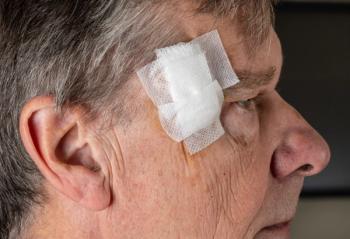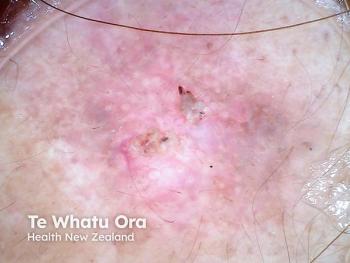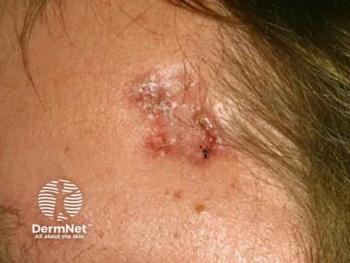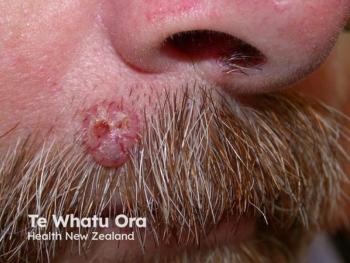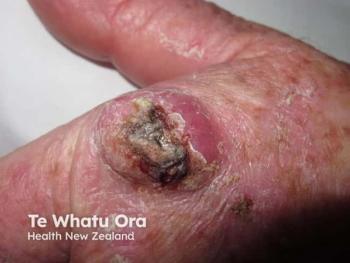
- Dermatology Times, July 2020 (Vol. 41, No. 7)
- Volume 41
- Issue 7
Immunotherapy implications for NMSC
The biology of nonmelanoma skin cancers and their strong immunogenicity makes these tumors good candidates for novel and emerging immunotherapeutic agents.
Immunotherapy can be very effective in the treatment of advanced non-melanoma skin cancer (NMSC), according to a recent paper that looked at the immunologic characteristics and current clinical data.1
“Immunotherapy has been transformative for patients with MCC and SCC, especially where surgery and radiation are not an option and for those who have metastatic disease. There are unique aspects of the biology of BCC, SCC and virus negative MCC that make them particularly sensitive to immunotherapy and good candidates for this treatment approach,” says Evan T. Hall, M.D., assistant professor, division of medical oncology, University of Washington, and Clinical Research Division, Fred Hutchinson Cancer Research Center, Seattle. He is head author of the study.
RELATED:
Nonmelanoma skin cancer is an exceedingly common, and the vast majority of patients do not require treatment beyond surgery. However, there are rare patients in whom surgery and/or radiation therapy is insufficient and who could potentially benefit from immunotherapy, he says.
Although the vast majority of patients with basal cell carcinoma (BCC) and squamous cell carcinoma (SCC) will not require immunotherapy, those who do have advanced disease is surprisingly high, which underscores the urgency for more effective treatment options, he says.
“Until recently, there really was no effective systemic therapy for those set of patients with advanced disease, with most patients relegated to surgery and variably effective courses of chemotherapy,” Dr. Hall says.
Pembrolizumab (Keytruda, Merck) and avelumab (Bavencio, EMD Serano and Pfizer) are two immunotherapy drugs that have proven to be very effective in the treatment of advanced Merkel cell carcinoma (MCC). Similarly, cemiplimab (Libtayo, Regeneron Pharmaceuticals and Sanofi Genzyme) has been effective in patients with SCC.
The very high response rates suggest a strong immunologic characteristic associated with these cancers. The data with pembrolizumab and avelumab demonstrate durable long-term survival in some patients, an uncommon occurrence for patients with MCC.
“Prior to immunotherapy, cytotoxic chemotherapy was commonly employed in patients with advanced disease, which usually led to brief responses but then the tumors would soon develop resistance. What we are seeing with pembrolizumab and avelumab is long-term survivors with MCC, which is truly remarkable for this patient population with historically poor outcomes,” says Shailender Bhatia, M.D., associate professor, division of medical oncology, University of Washington, and Clinical Research Division, Fred Hutchinson Cancer Research Center, Seattle, a senior author.
Also considered to be a major breakthrough, cemiplimab is the first drug approved specifically for cutaneous SCC that has demonstrated good efficacy in an increasing number of patients.
According to Dr. Bhatia, one of the most fascinating aspects of NMSCs is that they are a heterogenous group of cancers with different pathologies, but have similar etiologic factors including the association to UV radiation exposure. A proportion of MCC tumors are unique in their association with Merkel cell polyoma virus. Despite the different mechanisms of carcinogenesis, the NMSC tumors have an inherent immunogenicity coming from different sources, making immunotherapy almost a logical conclusion concerning potentially effective treatment approaches.
“The signatures in the mutations of cutaneous SCC, BCC, and virus negative MCC tumors is highly suggestive of UV exposure, and the mutational burden is among the highest seen in solid tumors. These mutations can lead to the formation of neoantigens, which can also drive immunogenicity. This is why the responses to immunotherapy are among the highest we see among solid tumors, and certainly comparable to, if not higher than what one would perhaps expect with melanoma,” Dr. Bhatia says.
Not all mutations lead to strong antigens, Dr. Bhatia says. More important than a sheer number of antigens are quality antigens needed to drive an immune response, and patients who have those quality antigens and the subsequent immune response are probably most likely to benefit from immunotherapy.
“There still is a lot of work to do, and future studies with long-term follow-up data could focus on more effective therapies for patients who do not respond, as well as finding better strategies to enhance the responses in patients who do respond to immunotherapeutic agents.”
Disclosures:
Drs. Hall and Bhatia report no relevant financial interests.
Reference:
1 Hall ET, Fernandez-Lopez E, Silk AW, Dummer R, Bhatia S. Immunologic Characteristics of Nonmelanoma Skin Cancers: Implications for Immunotherapy. Am Soc Clin Oncol Educ Book. 2020 Mar;40:1-10.
Articles in this issue
over 5 years ago
Injection technique aims to optimize outcomesover 5 years ago
COVID-19: Counseling patients on biologic useover 5 years ago
COVID-19 impact in patients on biologicsover 5 years ago
Study evaluates topical plus device for rosacea treatmentover 5 years ago
Apremilast treatment in a patient with COVID-19over 5 years ago
An examination of rosacea treatment satisfactionover 5 years ago
IL-17 inhibition a path of interest in rosacea treatmentover 5 years ago
Acne topical efficacy mixedover 5 years ago
Patient appearance challengesover 5 years ago
Physical sunscreens sidestep concernsNewsletter
Like what you’re reading? Subscribe to Dermatology Times for weekly updates on therapies, innovations, and real-world practice tips.

